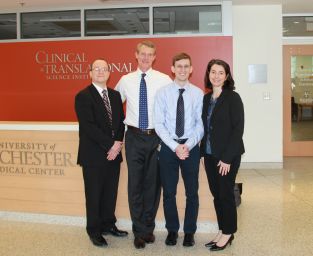Regulatory Science Competition Spurs Innovation

Scott Steele (Office of Research Alliances), Karl Kieburtz
(UR CTSI), David Brodell, and Joan Adamo (UR CTSI)
A new UR contest is encouraging students and trainees, as well as the whole research community, to think about how to turn advances in basic and applied sciences more quickly – and safely – into new ways to improve health.
The FDA launched its Regulatory Science initiative in 2010. The intention is to foster the development of new tools, standards, and approaches to assess the safety, efficacy and quality of any products regulated by the FDA.
These objectives, including creating ways to improve the complex drug and device development process, as well as strengthening social and behavioral science to lead to informed decisions, compliment the NIH’s Clinical and Translational Science Award (CTSA) program. The CTSA program, which URMC has participated in since 2006, was designed, in part, to create a new generation of researchers, physicians, and research professionals with the skills to undertake successful clinical research.
Last week, the UR Office of Research Alliances and the Clinical and Translational Science Institute (CTSI) hosted and sponsored the inaugural “America’s Got Regulatory Science Talent Competition.” Entrants were asked to submit and then present ideas that addressed FDA priority areas such as improving clinical studies and evaluation, harnessing diverse data through information sciences to improve health outcomes, developing prevention focused food safety systems, and strengthening social and behavioral science leading to informed decisions.
Three teams submitted proposals for the competition:
Team Cardioid (David Brodell) – The process of determining whether an experimental drug will be toxic to the heart could be transformed through the use of advanced computational simulations. In collaboration with IBM, URMC researchers are working to better understand the mechanisms associated with drug-induced ion-channel dysfunction through work with a complex computer model of the human heart made using the University’s Blue Gene/Q supercomputer.
Team Bio-Logic (Michael Moses and Allen Bennett) – E-cigarettes sales are increasing at an alarming rate. Unlike traditional cigarettes, the long-term safety of e-cigarettes has not been scientifically tested nor are they currently regulated by the FDA. Team proposed that product standards be established for e-cigarettes which include toxicology data to support safety and labeling to increase awareness and guide consumer decision-making.
Team Report-It (Abeer Abu-Zeitone) – Team proposed the creation of a FDA-approved user friendly, smart phone application that links (via a QR code) dietary supplement products and information about the product. System would facilitate the reporting of adverse events associated with supplement use and make this information more accessible to the public.
The competition is a partnership with the University of Maryland, which is home to a FDA-supported Center of Excellence in Regulatory Science and Innovation. The winner – David Brodell of Team Cardioid – will be traveling to Washington, DC to meet the winners from the Maryland competition and present their ideas directly to the FDA.
The competition is one of several events and initiatives organized by the CTSI and the Office of Research Alliances to promote Regulatory Science awareness and opportunities. A list of Regulatory Science news, events, and funding opportunities can be found at: click here

